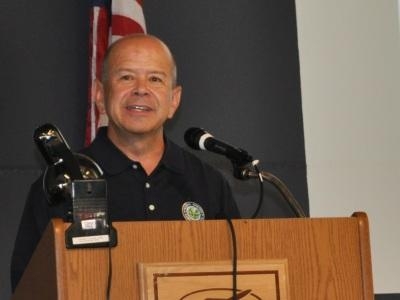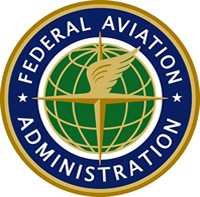Small Crowd Gathers To Hear Michael Huerta's Remarks
By Tom Patton
Acting FAA Administrator Michael Huerta made his first appearance at AirVenture in the top job Thursday, but the crowd that gathered only filled about a third of Forum Pavilion 7.

Huerta began his speech saying that at the FAA, they place a great deal of emphasis on reducing the number of fatal GA accidents, and cited statistics that seem to support that mission. He said there have been reductions in three fatal accident categories. Controlled flight into terrain accidents, accidents involving loss of control in flight, and approach and landing. Huerta said that the number of fatal accidents in those three categories is down by as much as 33 to 40 percent over the past five years. He also said that fatal accidents in IMC conditions and fatal accidents at night have decreased overall. He said that fatal accidents in experimental aircraft are 17 percent lower than they were in 2009, and that fatal accidents in that category in 2012 are decreasing faster than had been anticipated.
"But we have to make GA even safer," Huerta said. He said last year, there were 271 fatal accidents, which represented a slight increase over the previous year. "Too many accidents are still attributable to conscious risk taking, for example trying to beat the weather, not checking fuel prior to takeoff, and things like that."
Huerta asked those in attendance to commit to a personal safety check "for whenever you fly. This entails four things. First, a positive flight attitude. Professionalism needs to characterize every action that a pilot takes. Approach every flight as if your life depended on it ... because it does. Second, going beyond pre-flight. A proper pre-flight is more than using a checklist. It should test how well you know your aircraft, and all of its systems. Third, enroute cruise. Avoid complacency. Stay ahead of the aircraft. Plan for the unplanned, and always, always maintain situational awareness. And finally, maneuvering flight. Attention to airspeed is absolutely critical. Loss of control in maneuvering flight often results from inattention to airspeed."
Huerta went on to talk about ADS-B and its promise of additional advancements to safety and efficiency. He said areas where ADS-B is already in place, such as Alaska, have shown a 47 percent lower accident rate in ADS-B-equipped airplanes.
During the question and answer session, which was not moderated by EAA as had been anticipated, Huerta took questions on a number of issues of concern to the GA community, but was not particularly specific in his answers. On the certification of new products and airplanes, Huerta said it is one of the major priorities for the agency. "One of the things that we're very focused on is how can we continue to find the most efficient ways to certify a new product and get it to the market more quickly." Asked about user fees, Huerta said the President is focused on "the long-term sustainability of the aviation system. The FAA is funded through a combination of fees, ticket taxes, fuel taxes, and so forth, and then general fund support. We all know that as a government, we are dealing with some pretty significant fiscal challenges. And so I think the conversation that the President was trying to start is a conversation about how can we reduce the reliance on the general fund." He said the agency has heard "a
lot" from the aviation community, and "that is a conversation we're going to continue to have." He did say that in the current budget year, there is not a lot of support in the House and Senate for an increase in user fees.
One flight instructor asked about written exams that test a student's ability to perform calculations with an E-6B and navigate using NDB's, but don't necessarily reflect the current level of technology in the cockpit, particularly in technologically advanced aircraft. That question was answered by Flight Standards Service director John Allen. Allen said an ARC had just concluded to address that fact. "We know that these tests have become outdated ... and actually sometimes I think are counter-productive to bringing on better pilots and really testing their capabilities in new technologies and in airmanship." He said that there will be new methodologies and new testing coming out later this year.

One of the last questions came from a pilot faced with losing his job because he does not meet the new 1,500 hour requirement set in the recent FAA reauthorization bill. He asked "will you extend this deadline. Will you grandfather me, because I'm a perfectly good pilot. There's no reason why I should lose my job come August, 2013."
Huerta responded by saying that the 1,500 hour rule would only go into effect if the FAA did nothing, and the agency was working on ways to be flexible with those rules through credits for military time, education, and other program. The pilot asking the questions, however, said he did not qualify for those. "We've received a lot of comments on the rule of how we can better address this concern, and we're hearing it a lot," Huerta said. "The comment period is closed, we got a lot of comments on it, and we have to finalize a final rule and a final way forward. But if we don't' finalize the rule, then the law that was passed by Congress will set the limit at 1,500. What we're trying to do is look at more flexibility."
Huerta said that there will be an NPRM on residential Through-The-Fence regulations published in the Federal Register Friday, which will have a 30 day comment period.
Huerta is still awaiting a confirmation vote in the U.S. Senate, which may be scheduled before Congress adjourns for its August recess.
 ANN's Daily Aero-Linx (04.16.24)
ANN's Daily Aero-Linx (04.16.24) Aero-News: Quote of the Day (04.16.24)
Aero-News: Quote of the Day (04.16.24) Airborne 04.10.24: SnF24!, A50 Heritage Reveal, HeliCycle!, Montaer MC-01
Airborne 04.10.24: SnF24!, A50 Heritage Reveal, HeliCycle!, Montaer MC-01 Airborne 04.12.24: SnF24!, G100UL Is Here, Holy Micro, Plane Tags
Airborne 04.12.24: SnF24!, G100UL Is Here, Holy Micro, Plane Tags Airborne-Flight Training 04.17.24: Feds Need Controllers, Spirit Delay, Redbird
Airborne-Flight Training 04.17.24: Feds Need Controllers, Spirit Delay, Redbird




